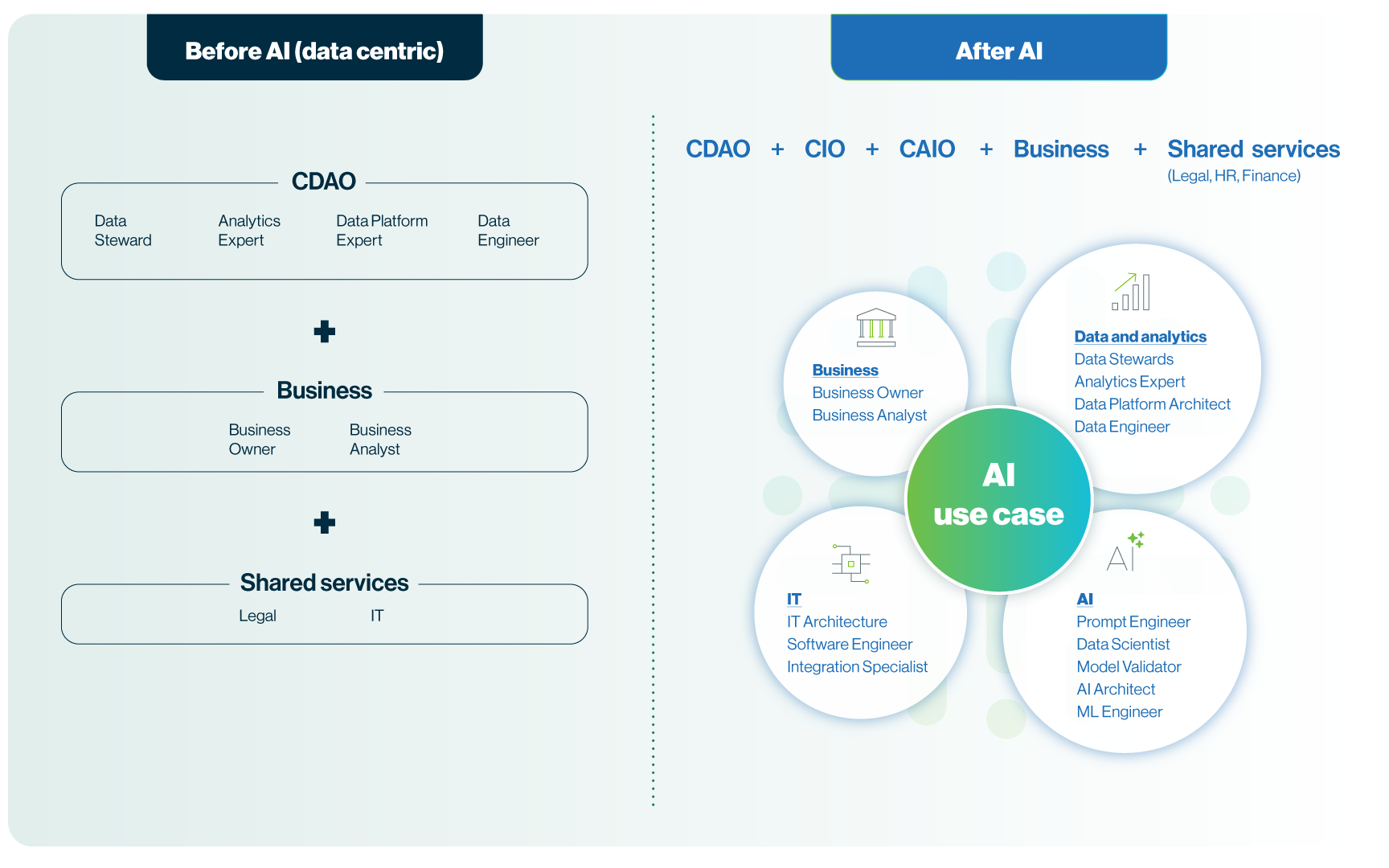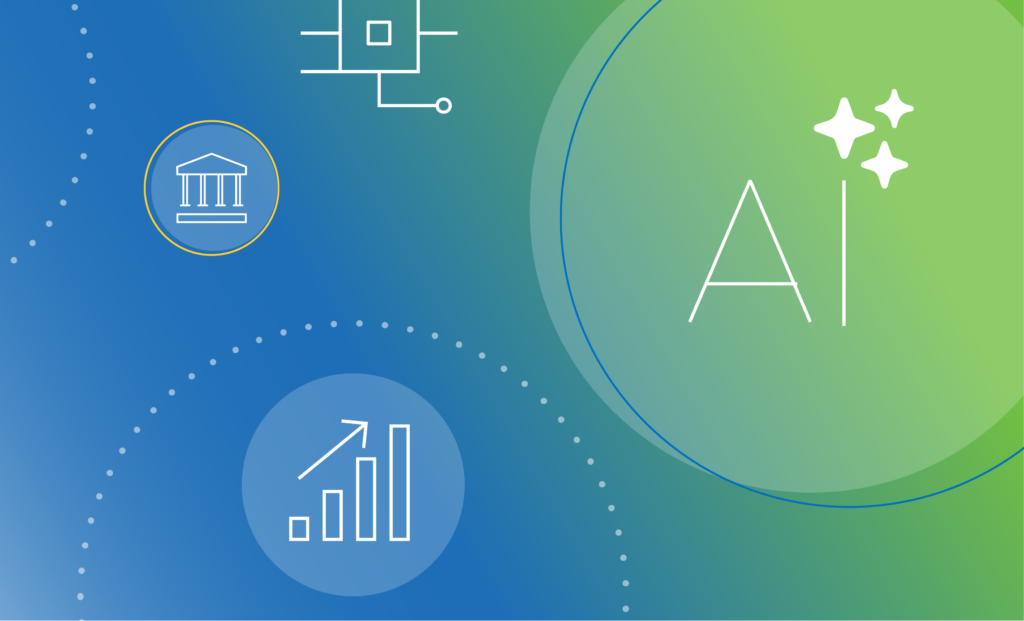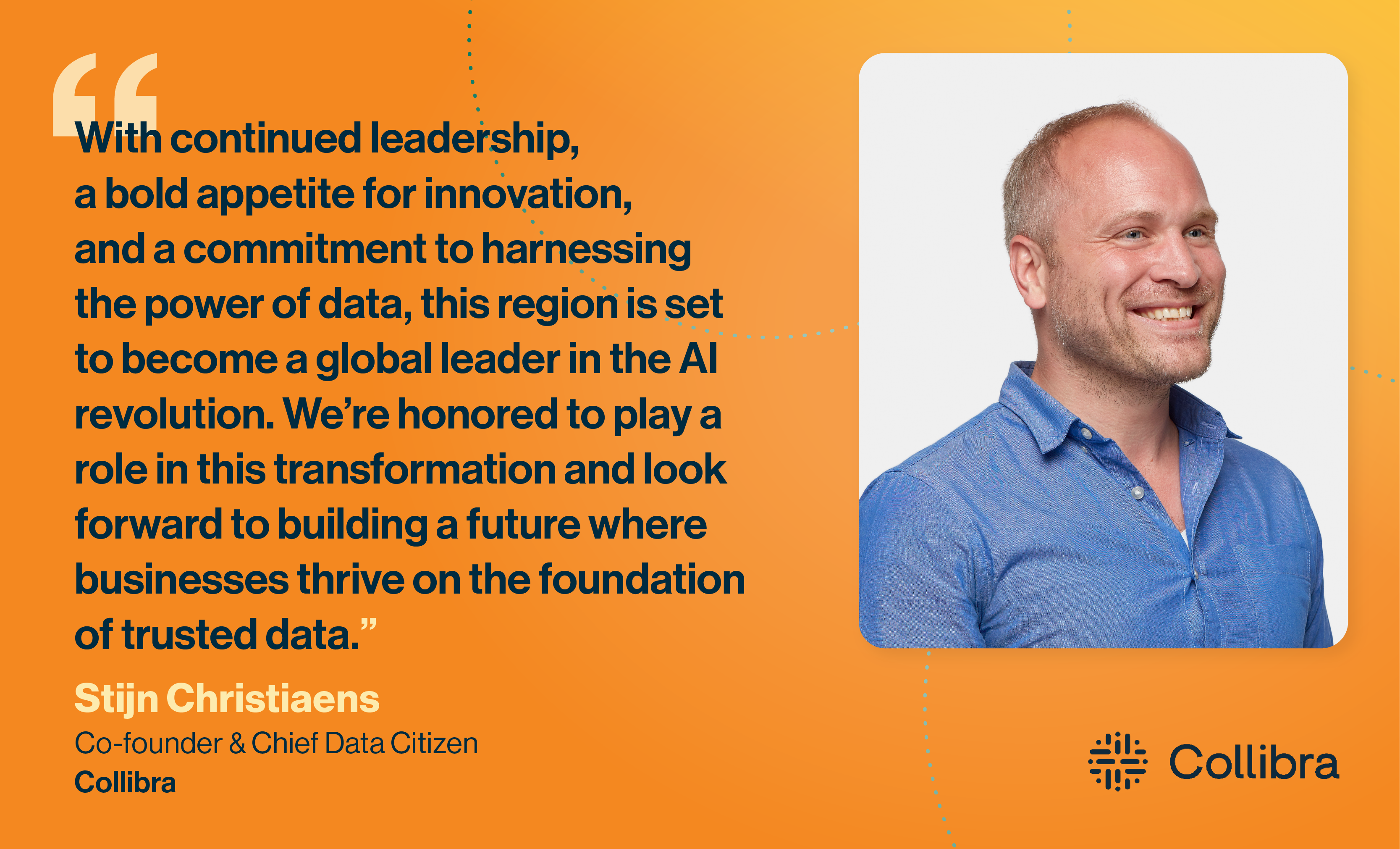As a Chief Data and Analytics Officer (CDAO) or Chief Data Officer (CDO), you stand at the forefront of transforming data into a strategic asset.
However, with an average tenure of roughly two-and-a-half years, CDAOs and CDOs have the shortest tenures of any C-suite executives, according to a 2023 Deloitte study (1).
For CDAOs to truly become disruptors, you need more time in the C-suite. So how do you achieve the strategic value you need to become a true organizational hero?
By accelerating AI adoption.
Today, a typical data use case can take 6 to 9 months to have an impact. With AI, however, new use cases can be rolled out fast — in weeks, instead of months — and accelerate value to your organization.
Fortunately, the path to not only surviving but thriving in your role isn’t technical and it doesn’t require large-dollar investments to achieve.
To drive value and create lasting impact, the key is fostering cross-collaboration.
The importance of cross-collaboration

The truth is, it has never been easy to be a CDAO.
The challenges are varied and complex – Data ownership across an organization. Siloed data. Skill gaps and talent shortages. A rapidly evolving technology landscape. Difficulty proving ROI.
And all this before the introduction of generative AI.
Today, however, the c-suite is abuzz with discussions of this transformative technology, and many executive leaders are eager to invest in its potential.
85% of executives say they will increase their spending on AI and generative AI in 2024.
89% of executives rank these initiatives as a top-three tech priority for 2024.
Source: Boston Consulting Group survey of 1400+ C-suite executives (2)
The upshot for you: CDAOs and CDOs are now presented with a once-in-a-lifetime opportunity to capitalize on AI enthusiasm and secure buy-in for AI initiatives.
But success isn’t only about upskilling, minimizing risk or navigating the vendor landscape — although these are all critical.
To turn your challenges into opportunities, your most valuable investment will be to foster exceptional cross-collaboration.
By breaking down silos and uniting critical data personas across the organization — from business units to IT to data/analytics teams to Legal — you can unlock the full potential of your organization’s data assets, driving significant business value.
The average CDAO tenure is roughly two-and-a-half years, among the shortest tenures of any C-suite executives.
Source: 2023 Deloitte study
Five strategies for driving exceptional cross-collaboration
As a CDAO, your ability to foster collaboration across organizational silos is critical to driving business value in an AI-driven world.
To achieve success, an important goal for your data office should be bringing these teams together. Why?
- Business owners provide valuable insights into your organization’s strategic goals and objectives. They understand the challenges and opportunities facing the business and can help align AI initiatives with these priorities.
- IT teams (including architects and engineers), play a crucial role in designing and implementing the infrastructure required to support AI initiatives. They ensure data pipelines, data storage and computing resources are scalable, secure and reliable.
- Data engineers play a crucial role in cleaning, integrating and preparing data for analysis. Their work ensures that the organization has a solid foundation of high-quality, reliable data to build upon.
- Data scientists, on the other hand, are responsible for extracting insights and value from this data. By applying advanced analytics and machine learning techniques, they can uncover new opportunities and drive innovation.
- AI experts — including prompt engineers, ML engineers, and AI ethicists — are all involved in developing and deploying safe, transparent and ethical AI applications to market. Collaboration among these experts and with the broader data/analytics team is crucial for delivering AI solutions that are both effective and trustworthy.
- Legal teams are essential for navigating the complex regulatory landscape surrounding data usage. They ensure that the organization remains compliant with laws like GDPR and CCPA while still being able to leverage data effectively.
By aligning their efforts with the needs of the business, you can create a virtuous cycle of AI innovation and success.
Here are five strategies for uniting data personas and driving impact:
1. Develop a shared vision
- Work with business leaders to create a compelling vision for how AI can support the organization’s goals.
- Communicate this vision clearly to business units, IT, and data/analytics teams, ensuring everyone understands their role in bringing it to life.
The benefit: A unified vision helps align disparate teams toward common goals, fostering a sense of purpose and direction that is essential for cohesive and effective collaboration.
2. Foster cross-functional collaboration
- Encourage data engineers, who build the foundation for AI success, to work closely with data scientists, who drive insights and innovation.
- Facilitate regular communication and knowledge-sharing between teams to break down silos and promote a culture of collaboration.
- At the same time, involve legal teams early in the AI development process to ensure compliance with regulations and ethical guidelines.
- By working together, these personas can navigate the complex landscape of AI and drive responsible, impactful innovation.
The benefit: This strategy not only enhances the team’s ability to innovate by leveraging diverse perspectives but also ensures AI initiatives are developed with a comprehensive understanding of technical, ethical and regulatory considerations, leading to more sustainable and responsible AI solutions.
3. Invest in skills development
- Provide opportunities for your business, IT and data/analytics teams to continuously grow their skills and stay up-to-date with the latest AI technologies and best practices.
- Encourage them to attend conferences, workshops and training sessions to expand their knowledge and bring new ideas back to the organization.
- Consider implementing cross-functional training programs to help each persona understand the others’ roles and perspectives, fostering greater collaboration and alignment.
The benefit: Continuous learning and development help keep the team ahead of the curve in a rapidly evolving AI landscape, while cross-functional understanding builds empathy and collaboration, leading to more effective problem-solving and innovation.
4. Establish clear governance frameworks
- Implement robust data governance processes to ensure the quality, security, and compliance of your AI initiatives.
- Work closely with business and legal teams to develop guidelines for the ethical use of AI, addressing issues such as bias, transparency and privacy.
- Engage data engineers and data scientists in the governance process to ensure that the frameworks are practical, effective and aligned with the organization’s AI goals.
The benefit: Clear governance frameworks not only protect the organization from potential legal and ethical pitfalls but also build trust among stakeholders, including customers and regulatory bodies, by demonstrating a commitment to responsible AI practices.
5. Celebrate successes
- Regularly share success stories that showcase the impact of cross-functional collaboration on AI initiatives.
- Highlight how formerly siloed teams have worked together to drive business value, improve customer experiences or solve complex problems.
The benefit: Celebrating these successes builds momentum, fosters trust and garners support for future AI initiatives, ensuring ongoing investment and resources. It also reinforces the value of collaboration and encourages a culture of recognition and appreciation within the organization.
Interested in setting up AI governance at your organization? You just need to know where to start and how to create a continuous lifecycle of improvement.
Check out our AI governance framework for help with this.
By implementing these strategies and understanding their benefits, CDAOs can become the catalysts for change and innovation within their organizations, extending their impact and tenure.
Be a CDAO hero today
As the world becomes increasingly AI-driven, your role is more critical than ever. Be willing to disrupt your current organization’s status quo and turn AI projects into competitive differentiators.
By implementing these five strategies, CDAOs like you can become the data heroes your organization needs.
- Develop a shared vision
- Foster cross-functional collaboration
- Invest in skills development
- Establish clear governance frameworks
- Celebrate successes
By championing cross-collaboration, building strong governance frameworks and aligning with your organizational objectives, you can secure your position and drive success for years to come.
At Collibra, we understand the importance of effective data management and collaboration. And we know successful AI initiatives start with trusted data. Our solutions are designed to help CDAOs and CDOs unite data personas and drive business value, especially in the era of AI.
Ready to be a CDAO hero? Why wait any longer? See why Collibra AI Governance is the perfect side-kick.
1 Deloitte, ‘Introduction to CDO 2.0.’ July 17 2023.
2 Boston Consulting Group. ‘From Potential to Profit with Gen AI.’ January 12, 2024.




